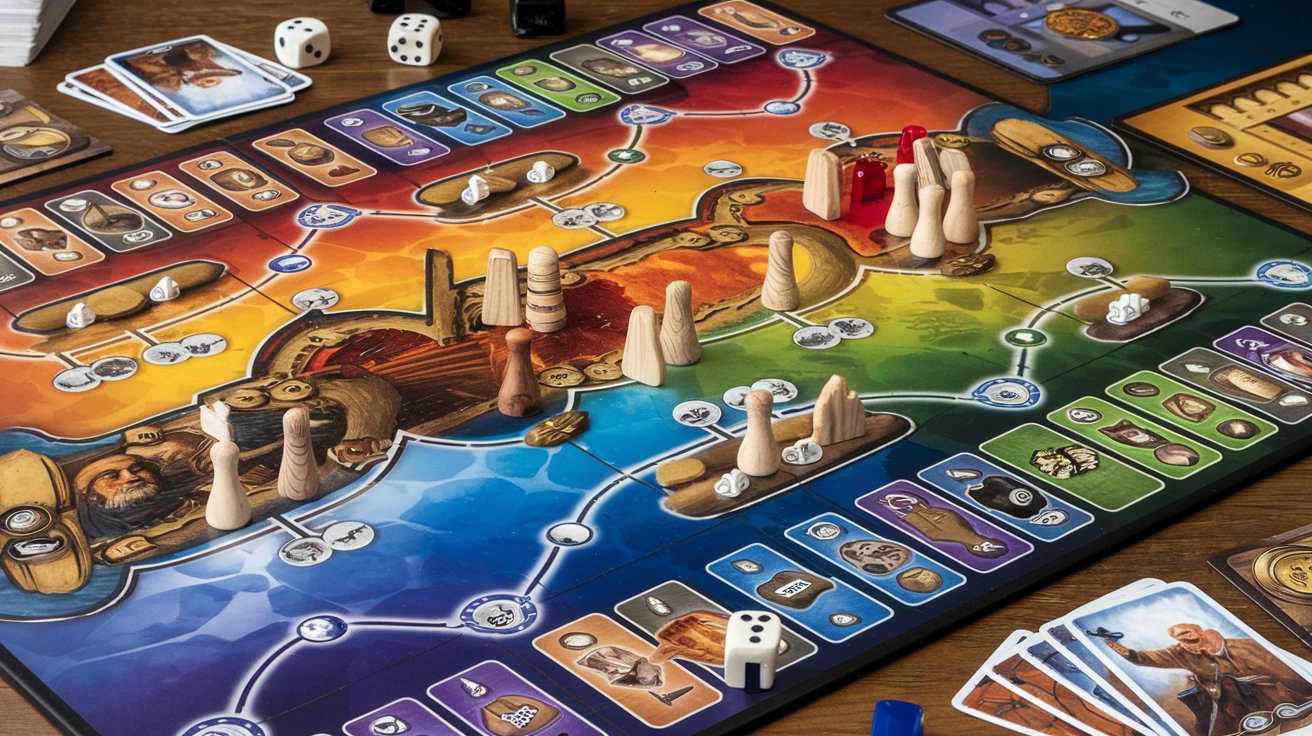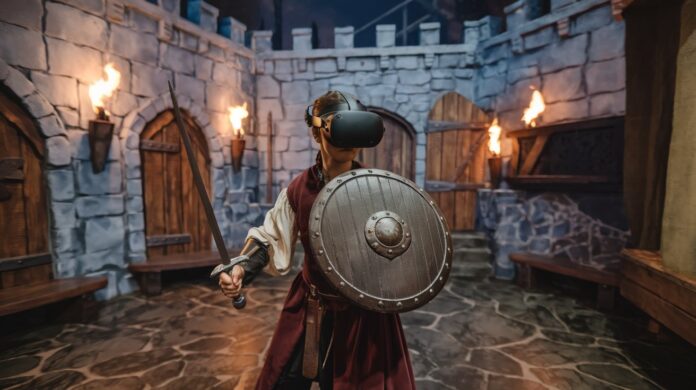In an age where digital entertainment dominates our leisure time, history games stand out as a unique blend of education and immersion. Far from the dry textbooks of traditional learning, these interactive experiences transport players across centuries, allowing them to not just learn about history but to live it. Whether you’re commanding armies in ancient Rome, exploring the intricacies of Renaissance politics, or solving mysteries in Victorian London, history games offer unparalleled ways to connect with our shared past.
The Rise of Historical Gaming: More Than Just Entertainment
Video games have evolved dramatically since their inception, growing from simple pixelated adventures to complex narrative experiences that rival cinema in their emotional impact and artistic merit. Within this evolution, historical games have carved out a significant niche, appealing to both dedicated history buffs and casual gamers looking for something more substantial than the latest shooter.
The appeal is obvious: while books and documentaries can tell us about history, games let us participate in it. This interactivity creates deeper engagement and often leads to better retention of historical knowledge. When you’ve spent hours navigating the political intrigues of the Italian Renaissance in “Assassin’s Creed II,” you’re unlikely to forget the names Medici or Borgia anytime soon.
Research increasingly supports this connection between gaming and learning. A 2019 study published in the Journal of Educational Psychology found that students who engaged with historical content through interactive media showed significantly higher knowledge retention compared to those who consumed the same information through traditional reading materials.
Types of History Games: Finding Your Historical Niche
The world of historical gaming is vast and varied, offering something for every interest and play style. Here’s a breakdown of the main categories you’ll encounter:
Strategy Games: Rewriting the Course of Nations
Strategy games place you in command of historical nations, armies, or empires. Titles like “Civilization,” “Total War,” and “Europa Universalis” allow players to make the grand decisions that shape history—whether to go to war, which technologies to develop, or how to govern conquered territories.
These games excel at demonstrating the complex interplay of factors that influenced historical outcomes. After watching your carefully cultivated Roman Empire collapse under the weight of barbarian invasions, economic mismanagement, and civil unrest, you’ll gain a new appreciation for the challenges faced by ancient rulers.
Action-Adventure: History as Playground
Perhaps the most popular category for mainstream gamers, action-adventure titles like the “Assassin’s Creed” series blend historical settings with engaging gameplay. These games typically follow fictional characters moving through meticulously recreated historical periods and locations.
While they take creative liberties with historical events, they often excel at environmental storytelling. Walking through a bustling recreation of Revolutionary Paris in “Assassin’s Creed Unity” provides a visceral sense of the era that few other mediums can match. Many of these games now include “Discovery Tour” modes that strip away the fictional elements, allowing players to explore historical settings purely for educational purposes.
Simulation Games: Living Daily Life in Different Eras
Simulation games focus less on grand historical events and more on everyday life in different periods. Titles like “Kingdom Come: Deliverance” emphasize historical accuracy in depicting medieval Bohemian society, while “This War of Mine” explores the civilian experience during wartime.
These games excel at humanizing history, reminding us that the past wasn’t just inhabited by kings and generals but by ordinary people navigating their daily lives under conditions very different from our own.
Narrative Adventures: History Through Personal Stories
Story-driven games like “Valiant Hearts: The Great War” or “Through the Darkest of Times” use historical settings as backdrops for powerful personal narratives. These games often focus on the human cost of historical events, creating emotional connections that purely factual accounts might miss.
By placing players in the shoes of individuals caught up in historical events, these games foster empathy and understanding across the centuries—perhaps their most valuable contribution to historical education.
Top History Games Worth Your Time
With thousands of titles available, finding the right historical games can be daunting. Here are some standout examples across different historical periods that balance entertainment value with historical merit:
Ancient History
- “Assassin’s Creed Origins” (Ancient Egypt): Features an extraordinary recreation of Ptolemaic Egypt, complete with a Discovery Tour mode that offers guided educational tours.
- “Total War: Rome II” (Ancient Mediterranean): Allows players to command Roman legions or lead rival civilizations in a comprehensive simulation of ancient warfare and politics.
- “Imperator: Rome” (Classical Antiquity): A grand strategy game focusing on the Hellenistic period following Alexander the Great’s death through the formation of the Roman Empire.
Medieval Period
- “Kingdom Come: Deliverance” (15th Century Bohemia): Praised for its commitment to historical accuracy in everything from architecture to combat techniques.
- “Crusader Kings III” (Medieval Europe): Less about warfare and more about dynasty management, political intrigue, and the personal stories that shaped medieval power structures.
- “A Plague Tale: Innocence” (14th Century France): Weaves the historical backdrop of the Black Death and the Inquisition into a poignant story of survival.
Early Modern Era
- “Age of Empires III” (Age of Exploration): Covers European colonization of the Americas, featuring diverse civilizations and historical campaigns.
- “Assassin’s Creed IV: Black Flag” (Golden Age of Piracy): Offers an immersive exploration of Caribbean pirate society in the early 18th century.
- “Europa Universalis IV” (1444-1821): A grand strategy game covering the Renaissance, Reformation, colonization of the Americas, and the early Industrial Revolution.
Modern Era
- “Red Dead Redemption 2” (American Frontier, 1899): Presents a detailed portrayal of the American West at the end of the outlaw era.
- “Battlefield 1” (World War I): While primarily a multiplayer shooter, its campaign offers vignettes from different fronts of the Great War.
- “Through the Darkest of Times” (Nazi Germany): Places players in the role of resistance members in 1930s Berlin, facing moral dilemmas and the day-to-day realities of life under fascism.
Learning History Through Gaming: Beyond Entertainment

While entertainment remains the primary goal of most history games, their educational potential is considerable. Here’s how to maximize the learning value of your historical gaming experience:
Fact vs. Fiction: Developing Critical Awareness
All historical games make compromises between accuracy and entertainment. Developing the habit of questioning “Did this really happen?” turns gaming into an exercise in critical thinking. Many games include in-game encyclopedias or codices that separate historical fact from dramatic license.
After playing, take a few minutes to research aspects that intrigued you. This habit can transform casual gaming into a gateway for deeper historical exploration.
Complementary Learning: Games as Starting Points
Games excel at creating interest and providing context but shouldn’t be your only source of historical knowledge. Use them as jumping-off points for further exploration. If a game sparks interest in Ancient Rome, follow up with documentaries, podcasts, or books on the subject.
Many history games now partner with educational institutions or historians to create accompanying content. The “Assassin’s Creed” series, for example, works with historians to produce short documentaries that expand on the historical settings of their games.
Classroom Integration: History Games in Education
Educators increasingly recognize the potential of historical games as teaching tools. Games like “Civilization” or simplified versions like “Historia” are finding their way into classrooms, used to illustrate concepts like technological development or resource management across historical periods.
For parents and teachers, discussing historical games with young players creates opportunities to separate historical facts from gameplay mechanics and narrative liberties.
Creating Your Historical Gaming Experience
Ready to dive into historical gaming? Here’s how to create a rewarding experience:
Choosing the Right Platform
Historical games span all gaming platforms, but certain types gravitate to specific systems:
- PC Gaming: Home to complex strategy titles like the “Total War” series or “Crusader Kings III” that benefit from mouse-and-keyboard controls.
- Consoles (PlayStation, Xbox): Ideal for action-adventure historical games like “Assassin’s Creed” or “Ghost of Tsushima” that benefit from controller play.
- Mobile Devices: Offer simplified versions of historical simulations like “Civilization Revolution” or unique experiences like “80 Days,” perfect for on-the-go learning.
Budget Options: History Gaming on a Shoestring
Quality historical gaming doesn’t require the latest hardware or full-price titles:
- Digital storefronts like Steam, Epic Games Store, and GOG regularly discount historical titles.
- Subscription services like Xbox Game Pass frequently include historical games in their libraries.
- Many older titles with historical settings run perfectly well on modest hardware while offering deep gameplay.
Modding Communities: Enhancing Historical Accuracy
For PC gamers, modification (or “modding”) communities often create enhancements that increase historical accuracy beyond the original game design:
- “Medieval II: Total War” benefits from overhaul mods like “Stainless Steel” that improve historical authenticity.
- “Mount & Blade: Warband” features complete conversions to different historical periods created by dedicated fans.
- “Hearts of Iron IV” has mods that dive deep into alternative historical scenarios based on real historical possibilities.
The Future of Historical Gaming: New Horizons
As technology advances, the potential for historical gaming continues to expand:
Virtual Reality: Truly Walking Through History
VR technologies promise to make historical immersion even more compelling. Imagine not just controlling a character in Ancient Rome but feeling as though you’re actually standing in the Roman Forum, with the sounds, sights, and scale of history surrounding you in three dimensions.
Projects like “Rome Reborn VR” already offer glimpses of this future, allowing users to explore historically accurate reconstructions of ancient sites through virtual reality headsets.
AI and Procedural Generation: Infinite Historical Scenarios
Advances in artificial intelligence are enabling games to create more dynamic, responsive historical simulations. Rather than following scripted historical paths, these technologies can generate plausible alternative histories based on player actions and historical probabilities.
Games like “Crusader Kings III” already implement aspects of this approach, creating emergent narratives that blend historical starting points with player-driven outcomes.
Collaborative Historical Worlds: Learning Together
Online multiplayer experiences set in historical contexts offer unique opportunities for collaborative learning. Whether reenacting historical battles in “Holdfast: Nations At War” or building historical civilizations together in “Anno 1800,” these shared experiences create communities where historical knowledge becomes a valued social currency.
Conclusion: Gaming as a Window to Our Past
Historical games represent more than just entertainment—they’re powerful tools for connecting with our collective heritage in ways previous generations could hardly imagine. By allowing us to step into the shoes of historical figures or ordinary people from different eras, these interactive experiences foster understanding across time.
Whether you’re a dedicated history enthusiast or simply curious about the past, today’s diverse landscape of historical games offers countless ways to engage with history on your own terms. From grand strategy titles that span centuries to intimate narrative adventures focused on specific historical moments, there’s never been a better time to explore history through gaming.
So pick up that controller, mouse, or mobile device and prepare for a journey through time. The past is waiting to be experienced—not just learned about—one game at a time.

Zareb Saleh is a journalist at Gulf Today and a ghostwriter for Gameoholic, specializing in gaming, technology, and digital culture. With a keen eye for industry trends, he delivers insightful stories that engage and inform readers.




